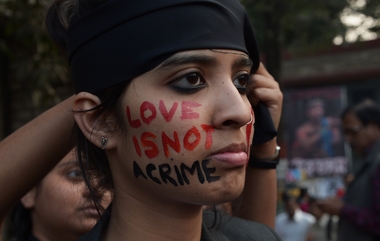India's progressive court stands in contrast to its not so progressive politics

September was a supremely busy month for India's Supreme Court.
Over the course of a few weeks, its judges decriminalized gay sex and wiped away a sexist adultery law, both relics of India's colonial past.
They also tackled centuries old religious orthodoxy, ordering a Hindu temple in southern Kerala state to scrap a rule barring the entry of women of menstruating age. The restriction, they said, was discriminatory; what mattered, above all, was "constitutional morality."
"Prohibition can't be regarded as an essential component of religion," the top court said in the latest in a series of progressive judgments.
Which is why, as Washington remains consumed by controversy over the nomination (and subsequent confirmation) of Brett Kavanaugh to the US Supreme Court, here in India, newspaper headlines surrounding the country's own judicial body have been altogether more positive.
The day after the ruling decriminalizing gay sex the front page of the leading Times of India daily proclaimed "Independence Day-II." The rival Hindustan Times ran a picture of the Supreme Court building in New Delhi with the headline: "Rainbow Nation."
Weeks later, after the court -- whose justices are appointed by the Indian President on the recommendation of a group of top judges -- struck down a law that criminalized adultery and treated a wife as the property of her husband, the Times of India welcomed what it called "another historic verdict that takes law out of the bedroom."
Not that the court, face a mandatory retirement age of 65 instead of holding their posts for life, hasn't been criticized for its interventions in Indian life, handing down, at different times, both liberal and conservative judgments, sometimes in relatively quick succession.
In 2016, for example, it ordered all movie theaters to play the national anthem before every film (before reversing its decision in 2018). And before it swept away the gay sex law in September, it was the Supreme Court that upheld the provision, overruling a lower court, back in 2013.
The September euphoria also overshadowed the lackluster response from political leaders in what remains a deeply conservative country.
Take, for example, the response to the court's decision on September 6 to legalize gay sex. Even as activists, lawyers and the Indian -- and international -- press celebrated its demise, the country's rulers were largely silent.
There was no official reaction from Prime Minister Narendra Modi, who is usually quick to use his twitter feed to comment on the big issues of the day. Including, in the past, news from the Supreme Court. Not this time, though, perhaps reflecting the conservative leanings of his ruling Bharatiya Janata Party's base.
A clue came in the response of the Rashtriya Swayamsevak Sangh (RSS), the right wing Hindu nationalist group closely associated with Modi's BJP.
A number of top BJP leaders, including Modi, spent years as RSS members before making the shift to frontline politics. The group said that while it agreed with the court that homosexuality wasn't a crime, it said it still regarded homosexual relations as "not normal."
"We do not support this kind of relationship," RSS spokesperson Arun Kumar said in a statement, according to CNN affiliate CNN News 18.
Other political parties were more welcoming, including the main opposition Congress.
Later in the month, after the court said that women aged 10 to 50 couldn't be barred from entering Kerala's Sabarimala Temple, the RSS appeared to back protests against the ruling, criticizing steps by local authorities to implement the ruling "without taking the sentiments devotees into consideration."
In the case of the adultery ruling, Modi's government had opposed striking down the provision under which any man who had sex with a married woman, without the permission of her husband, risked prosecution.
It had insisted that adultery should remain a criminal offense. In a submission to the court, the government argued that the rule, known as Section 497, "supports and protects the institution of marriage."
Striking down the law, it warned the court, "will prove detrimental to the intrinsic Indian ethos which gives paramount importance to the institution and sanctity of marriage."
The judges thought otherwise.
Their ruling, in this and the other cases in September, didn't just strike a blow for progressive values; it also underlined the often not so progressive nature of India's politics.
Analysis by Nikhil Kumar, CNN.The-CNN-Wire™ & © 2018 Cable News Network, Inc., a Time Warner Company. All rights reserved.
The Galy. 10/7/2018 @ 10:05 a.m. CST.





